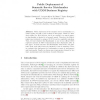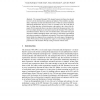74
Voted
SEMWEB
2004
Springer
15 years 8 months ago
2004
Springer
117
click to vote
SEMWEB
2004
Springer
15 years 8 months ago
2004
Springer
We argue that in a distributed context, such as the Semantic Web, ontology engineers and data creators often cannot control (or even imagine) the possible uses their data or ontolo...
145
Voted
SEMWEB
2004
Springer
15 years 8 months ago
2004
Springer
The standardization of the second generation Web Ontology Language, OWL, leaves a crucial issue for Web-based ontologies unsatisfactorily resolved: how to represent and reason with...
159
Voted
SEMWEB
2004
Springer
15 years 8 months ago
2004
Springer
SemanticOrganizer is a collaborative knowledge management system designed to support distributed NASA projects, including multidisciplinary teams of scientists, engineers, and acci...
101
click to vote
SEMWEB
2004
Springer
15 years 8 months ago
2004
Springer
Public deployment of the semantic service matchmaker to a UDDI registry for half a year is shown in this paper. UDDI is a standard registry for Web Services, but if we consider it ...
SEMWEB
2004
Springer
15 years 8 months ago
2004
Springer
Abstract. In this paper, we present an evaluation of four knowledge base systems (KBS) with respect to use in large OWL applications. To our knowledge, no experiment has been done ...
117
click to vote
SEMWEB
2004
Springer
15 years 8 months ago
2004
Springer
The emergent Semantic Web, despite being in its infancy, has already received a lot of attention from academia and industry. This resulted in an abundance of prototype systems and ...
108
Voted
SEMWEB
2004
Springer
15 years 8 months ago
2004
Springer
The Semantic Web is bound to be untrustworthy and inconsistent. In this paper, we present an initial approach for obtaining useful information in such an environment. In particular...
108
Voted
SEMWEB
2004
Springer
15 years 8 months ago
2004
Springer
Ontologies are seen as the solution to data heterogeneity on the web. However, the available ontologies are themselves source of heterogeneity. This can be overcome by aligning on...
SEMWEB
2004
Springer
15 years 8 months ago
2004
Springer



